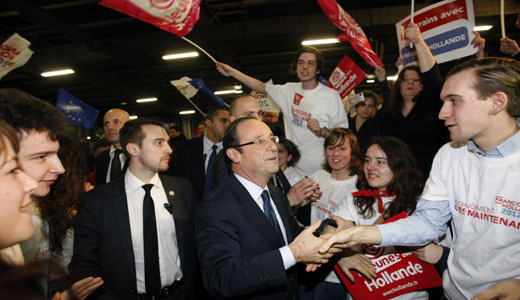
In an attempt to mobilize his base, Socialist Party presidential candidate François Hollande proposed a sharp tax hike for high-income earners. The move came as a surprise to some in his own party and is seen as an effort to unite the French left ahead of the April 22 presidential elections.
Hollande replaced the initial primary front-runner, Dominique Strauss-Kahn, who has been hit with much-publicized allegations of sexual assault. Hollande was widely expected to run a campaign geared towards capturing centrist voters. His tax proposal calls for an increase in the top tax bracket from 48 percent to 75 percent for people earning over €1 million ($1.3 million).
Current President Nicolas Sarkozy scoffed at the plan, calling it an improvisation, which showed “dismaying amateurism.” But French voters responded positively to the proposal, with recent polls showing a slight uptick in support for Hollande.
Hollande’s proposal sparked claims among some economists that high wage earners, including sports figures, would rather depart the country than pay more in taxes. The tax increase is expected to affect between 7,000 and 30,000 people (in a country of over 65 million).
When France’s football association criticized the plan, Hollande responded on Sunday by questioning whether the players’ performance justified their astronomical salaries. Athletes are among the most well-paid workers in France, although their European counterparts earn much more.
“This measure is not about bringing a single euro into state coffers, it is motivated by a form of patriotism that the country needs,” Holland told a group of supporters in Lyon. “My campaign is one for the middle class, not the privileged.”
The Socialist candidate is in a stronger position to defeat first-term President Sarkozy, who trails behind Hollande in issues pertaining to jobs and the economy. Hollande’s message capitalizes on Sarkozy’s perceived affinity towards the affluent, and is considered likely to resonate with workers who see rising executive salaries and bonuses in the face of stagnant wages.
Last year, a group of 16 of France’s wealthiest citizens signed a petition asking the government to raise taxes. “We are conscious of having benefited from a French system and a European environment that we are attached to and which we hope to help maintain,” they said in a statement. Among the signatories were billionaire heiress Lilaine Bettencourt of L’Oreal and Jean-Cyril Spinetta, president of Air France.
French voters have become increasingly frustrated with the slow pace of economic growth, a 9.8 percent unemployment rate, the fiscal crisis haunting the eurozone, and the prospects of more austerity measures. Opinion polls show Hollande with a double-digit lead in a hypothetical run-off election, to be held May 6.
Hollande, who supports a financial transaction tax popularly known as the Robin Hood tax and who once claimed to be the “enemy of finance,” is also facing criticism from the left. He came under fire last month for telling foreign journalists that, “Today, there are no communists in France, or not many,” before quickly backpedaling.
Jean-Luc Mélenchon, the candidate of the Left Front, which includes the Communist Party of France, says he is “convinced that the more François Hollande plays the anti-capitalist violin, the more he validates the words I use. It enlarges our scope.” If Mélenchon does not come out on top in the first round, his supporters are expected to coalesce behind Hollande.
Mélenchon, as well as Marine Le Pen of the far-right National Front, and François Bayrou of the centrist Democratic Movement, have each failed to receive more than 20 percent support from voters when asked about their preference in the first round.
Sarkozy’s Union for a Popular Movement suffered a crushing defeat when it lost control of the Senate last fall. It was the first time the Socialists gained a majority of seats in the Senate in the Fifth Republic (1958-present), and the third consecutive senatorial election in which left-wing parties gained new seats.
The prospects of passing such tax-the-rich legislation will depend on parliamentary elections, which will be held one month after the presidential run-off. If enacted, France would have one of the highest top tax rates in Europe, surpassing that of Sweden (56.6 percent), Denmark (55.4 percent) and the Netherlands (52 percent).
Photo: Hollande shakes hands with supporters as he arrives at a campaign meeting in eastern France. Mathieu Cugnot/AP












Comments